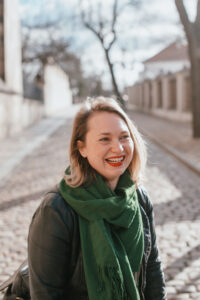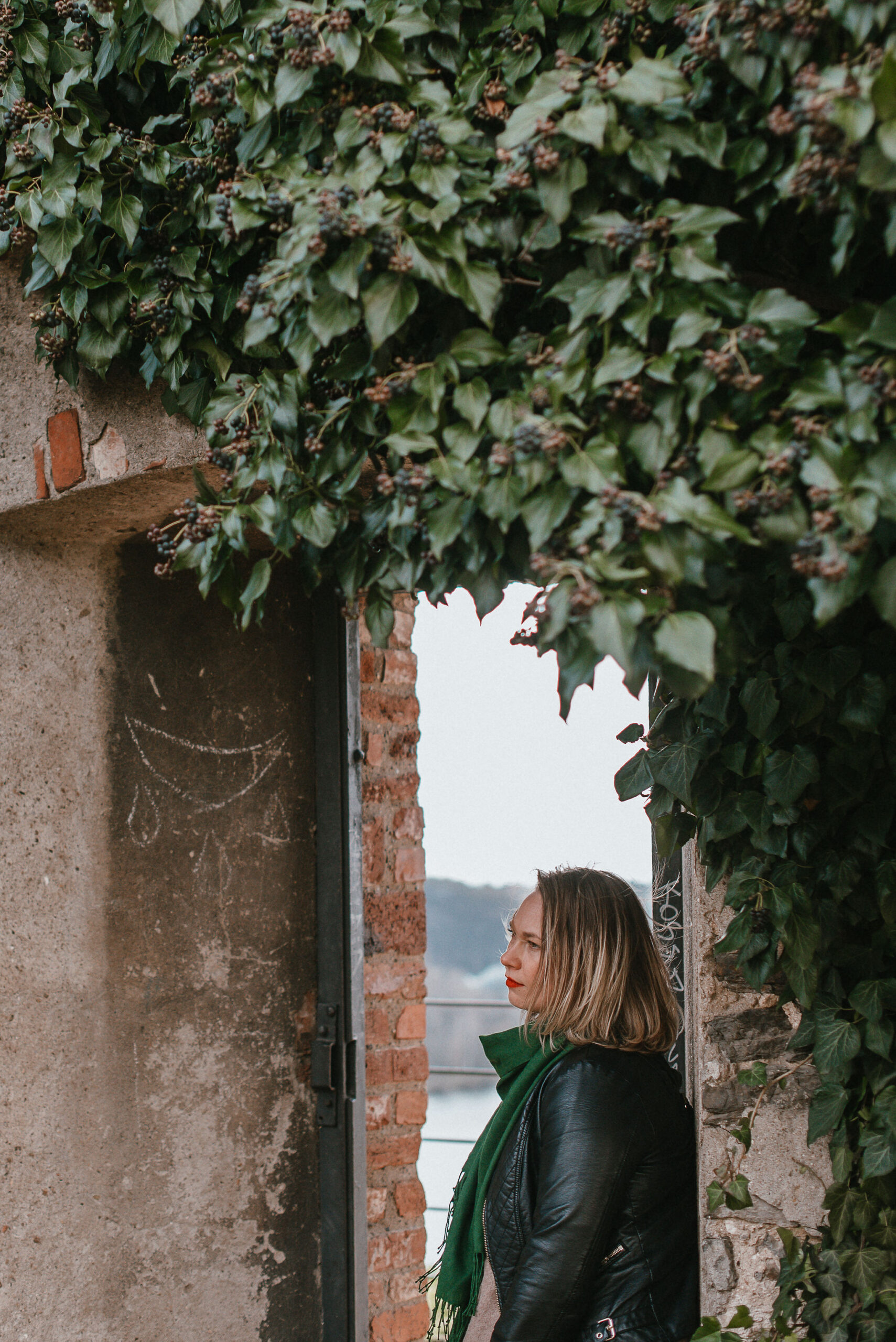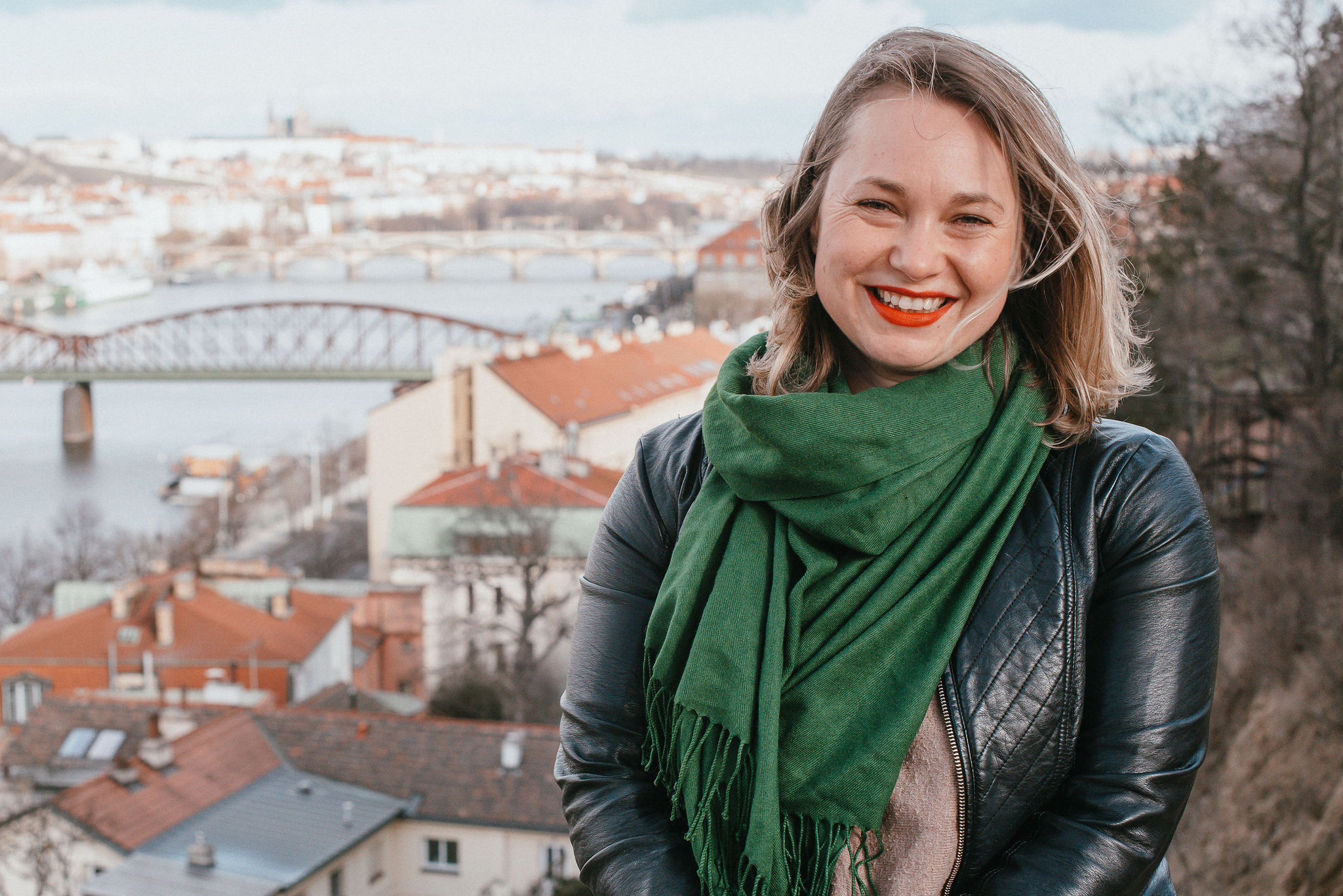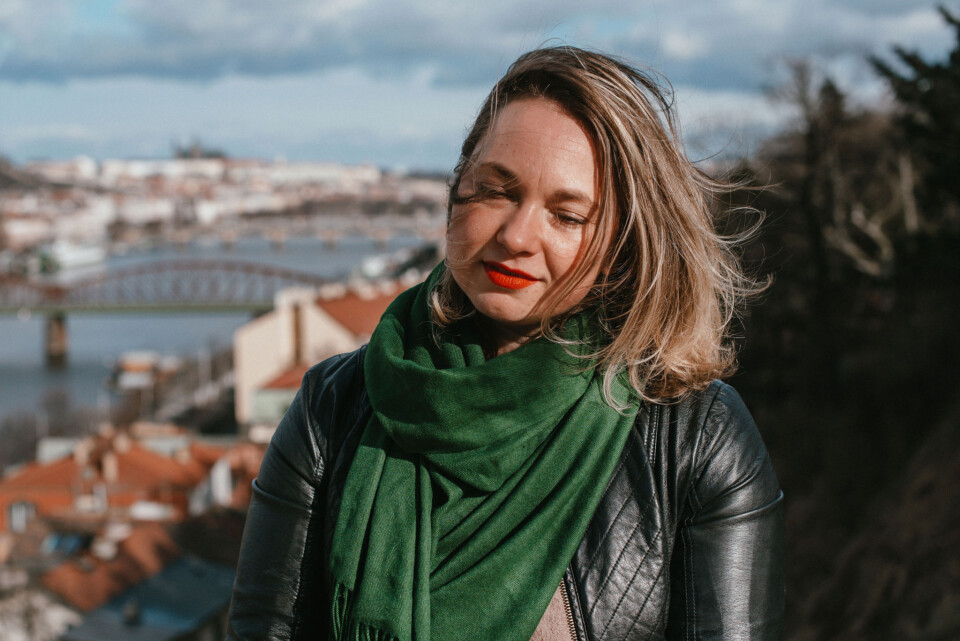V E R O N I K A
Prague | 2021

V E R O N I K A
City — Prague
Age — 36
Love life — Married, 2 kids (9 and 7 years old)
Profession — HR Manager for an international pharmaceutical company
Location — Vysehrad (‘upper castle’)
T H E P R A G U E S T O R I E S
‘I’M FULLY
AWARE OF
HOW LUCKY
I AM’

- What makes you different than other Czech women? “Most women in my culture do the cooking, for their husbands and kids. And it takes them hours to prepare those typical Czech dishes. But I don’t cook that much, I’m fully on board with 50/50 parenting and 50/50 gender roles. I’m married to an Australian who was already raised that way, but I felt strong about it even before I got married. So my husband cooks – and way better than I can, while we’re at it. Most of the time the laundry is done by him as well. I organize bills and do grocery shopping, but I’m also comfortable fixing the fence. Everyone just does what needs to be done. I’m not a typical Czech mom. My grandmother told me: ‘You need to learn how to cook, so you can get married.’ But my boy will be doing the same chores as my daughter. This 50/50 partnership has been also very good for my career. I’ve been promoted nearly every year and a half after my maternity and that wouldn’t have been possible if I didn’t have a supportive partner who shares the household logistics and workload. We have each other’s backs.”
- What is your greatest struggle? “My biggest and continuous struggle is to do it all the right way. I want to be good at my job and have a great career, and I also want to be a great mom, good wife and good friend. I just can’t do it all. I think my biggest struggle is coming to terms with it. I love challenges, so I delude myself into thinking that I can do it all, but I cannot. I always need to pick what has the highest priority at that moment and – temporarily – give up on other things. I’ll be honest, over the last couple of years I’ve spent a lot of time focusing on my career and naturally my other top priority are my children, so I’m trying to juggle those two. I’m also trying to spend time with my husband – and that’s where reality catches up with my ideals. It’s oddly beneficial that we both have similar management roles in large corporations, and we face very similar difficulties. Very often, in our private time we talk about work. We feed each other a lot of professional energy and inspiration and help each other wherever we can. But I will admit, the personal part struggles way more than the professional one and we often need to remind ourselves to take time off and focus on our relationship a little more. But we have a great relationship and after 15 years we still love spending a lot of time together.”
- What is your greatest life lesson? “Living abroad. I moved to Australia when I was 19. I had just finished high school and I wanted to learn English and travel as far away as possible, so I picked Australia. There I have learned a lot about myself and other people. The Czech Republic at that time was very isolated, most of our population was Caucasian and everything other than that was considered odd. It’s not that I would consider my culture racist, but we just hadn’t been exposed to other cultures and nationalities as much. When I went to Australia, it was the first time I had a chance to live within another culture. I had a lot of Indian and other Asian friends and classes with many Africans as well as other Europeans. There and then I started to realize that in all of us there’s something different and something similar. We ultimately all have the same issues. I also realized that I like certain things from other cultures more than from my own. Czechs generally stick to their own business. Everyone can do whatever they want, and we expect that they leave us alone as well. In Australia, everyone is very friendly and seems interested. When everyone started to ask me daily ‘How are you?’ it felt a little bit strange in the beginning. My first thought was ‘Why do you care?’ but then I realized, they were just trying to be nice and pleasant. I learned to love it. When I came back to the Czech Republic, I missed those friendly shop assistants. Their positivity and friendliness to strangers really make a difference. In Czech they almost grunt at you and make you feel like you are bothering them if you want to pay. I feel like it is getting better and better over the last decade, but in those days, you wouldn’t dare ask shop assistants how their day was. Those experiences helped me to learn how I want other people to treat me and how I want to treat them. I projected this customer-centric experience a lot at my work. And I will continue to smile at shop assistants, just because I can. Eventually people will smile back.”

- What advice would you give to other women in Europe? “Be who you want to be and be happy with who that person is. Do not let others dictate what feels right to you. Who especially should hear this, are girls from countries where traditions are still strong and women must have certain roles to be socially accepted. Don’t ever let anyone else tell you what you can or cannot be, because that’s nonsense. It’s very easy to lose yourself in what society expects of you. In that moment, stop and think what you really want, what brings joy to your life and do that. If you fail yourself in what you want to be, you are going to be the one who must live with that failure. No one else will.”
- What is the best advice anyone ever gave you? “During hard times, be REALLY present. I’m saying this because I consider myself a fixer and a good planner. I like to solve problems and remove obstacles, personally and professionally and like to have control over the outcome. I get stressed when things aren’t going as planned and I’m losing control, or when I must improvise. But oddly enough, when I focus on just the present moment and take it step by step, it puts my mind at ease. So sometimes when I feel very stressed, I stop planning and just enjoy the moment.”
- What is your greatest disappointment? “I wouldn’t say that I feel disappointed often. If I don’t like something, I try to change it. But there were things that I had no influence over. Like the fact that my granddad – who was super excited that he finally had a boy in our family – didn’t have a chance to see my son grow up. Or that my husband’s mother doesn’t have a chance to build the relationship she would like to have with my children, because she lives in Australia. We do Skype calls every weekend, and every year around Christmas we go to Australia, or meet somewhere halfway, but in the end, it’s not enough. But if we’d choose to live there, then my mom wouldn’t be there. So I do feel disappointed that we always have to choose who will have less time with us and our kids as we grow up on two different continents.”
- What is your biggest fear? “Like every mother, you terribly and permanently fear that your kids aren’t going to be healthy, that something bad is going to happen to them. But my biggest fear are things out of individuals control, like war, horrible social conditions, or economic conditions that you cannot influence for anyone. I think I’m fully aware and very grateful for how lucky I am in my life, and the idea that I wouldn’t be able to influence the outcome of events that are impacting me and my family’s life is very scary.”
- What is your deepest sadness? “I’m lucky that I would not consider anything that has happened in my life a tragedy. For me, sadness comes from the realization that not everyone has this luxury. It makes me sad that there are people who struggle, who don’t have healthy children. I purposefully desensitize myself and try not to pay attention to it, so I don’t get sad over it all the time. I even handpick what kind of global news I’m watching. It’s inherited sadness, as I remember making fun of my grandma when I was younger because she was crying while watching the evening news. The older I get, the more I become aware that the ultimate sadness is knowing that there are some horrible things in the world that I just can’t fix. I’m also aware that hiding myself from awareness and desensitizing myself doesn’t actually help to make the situation better. Unfortunately, there are a lot of people who think like me and that doesn’t fix the problem, so nothing ever changes. Even thinking about this makes me sad.”
- What is your biggest dream? “My number one hope and dream is that my kids will be happy and healthy and will grow into good people. For myself, when I retire, I want to have a beach house with my husband where I’ll have a huge library filled with books. When I sleep, I’ll hear the waves and during the day, I’ll read all those books. And I would like to have a small wine shop. I particularly like small wine makers that don’t have enough acres to supply big shops. It’s that hedonist in me: I love good wine, and the wine from small winemakers is different and slightly unpredictable every year. The lure is that there’s a limited number of bottles, so my customers would be able to buy only a certain number of specific wines from their favorite winery. Then they would have to await next year’s harvest to see how the same grapes taste in another year. They would have to enjoy it and then move on to something else, regardless of how much they like it. It can be frustrating, because last year’s Chardonnay from a small wine maker here in Czech Republic… it’s spectacular, but I will not find that specific wine anymore, I can only hope that next year’s Chardonnay will be as good or better. It’s like a tiny adventure for your taste buds every year.”
- Is there something you regret? “I’m not really big on regrets, because if I don’t do something well, then I learn from it. I do have some things that I would do differently the second time around, like when I moved to Australia, I didn’t travel around the country a bit more. I moved to Perth and settled in the city for a year and a half to study and work, so I didn’t explore the beauty of the country enough and didn’t see what I could see there. So maybe the beach house for our retirement plan would be in Australia. Or maybe New Zealand – their Sauvignon Blanc is even better. I also believe that I missed my chance to learn another language easily when I was younger and my learning curve was much steeper. I studied German in high school, but I really didn’t like that language and couldn’t find any joy in using it. I regret that I didn’t switch to a different language when I had to spend so many hours learning a language anyway. Now I speak only two languages, but I’d love to learn more. So, I’m a persistent beginner for the last two years in French, but I have to admit, it’s way harder than I remember.”
- How would you describe a typical women from Prague? “We have a huge expat community nowadays and I work for an international company, so I don’t come across too many Czech women, so it is hard to generalize. If you’d ask me what a typical Czech was 20 years ago, it was very straightforward. The women would stay home with the children for quite a long maternity leave (4 years per kid is a possibility in Czech) and the husbands would go to work. On the weekends the men would sit on the couch watching football, drinking beer or work in the shed or garden while women would take care of the household and kids. A lot has changed, especially in Prague. Women are very highly educated. Now they do a little bit more traveling in their 20s, they meet people, they work, and in their 30s, they start thinking about having a family life. But by then they often seem to feel they’re compromising who they’re settling for. So often I feel that they marry men they otherwise wouldn’t marry, simply to have a baby. I think we’re still in the transitioning phase. We’re coming from those typical female roles that our mothers and grandmothers taught us and through education and traveling we’re becoming more like French and other western European women, who are ahead of us in that department. But we’re on the way!”
Photos by Nataliya Yashchuk

